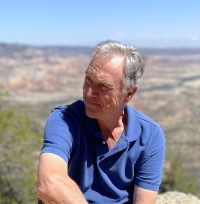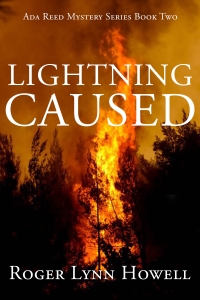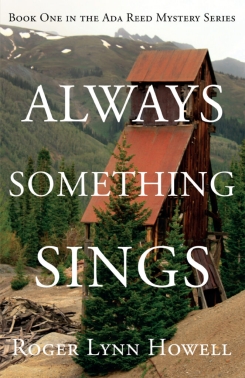Always Something Sings
Book One in the Ada Reed Mystery Series
Published by Epicenter Press, Coffeetown Press
The big machine components kicked in one by one: the trommel started its clanking rotation, pumps began to chug, and water sprayed over the shaker tables and rippled down the long sluice boxes. At the sound of a bell the stacker belt started up, although it and everything else were still running naked—empty of rocks—so the dredge was almost quiet. Engineers high in the pilothouse discussed the pattern they would work today, and their voices carried to the lower decks.
Colemaker ran the production deck, and he worked the levers at the top of the bucket line where it dropped its load of boulders, cobbles, and gravel into the trommel. The trommel separated sands and gravels from the coarser material, which rolled down onto the stacker belt to be deposited out the stern. At a quarter to six he phoned up to the pilothouse, then pulled the lever that engaged the wheels and belts to start the bucket line moving. The iron buckets, big as bathtubs, crawled slowly over the cogs and rollers of the massive bucket truss. A full five minutes of empty buckets rolled by dumping only water, as each was checked for wear and for loose pinion bolts.At a signaled ‘good to go’ from the men below, Colemaker spoke again into the phone, and a minute later the bucket truss started a slow descent. The whole barge shuddered as buckets scraped bedrock. Winches pulled the barge forward, and as they began to cut into the gravel bank, all felt the bow dip under the weight of full buckets and heard the strain of the diesels as the dredge began to lift out a landslide of rock and sand.
He slapped his ears to remind the crew to put on earmuffs, then turned and braced himself for the clamor and quake. Down valley they’d dug up acre on acre of gravels—five miles of riverbed—and he’d seen the occasional geological oddity brought up with the rocks. But since they’d edged up on the town, and then into the old neighborhoods themselves, the oddities were more frequent and a lot less geological.
The first full bucket reached the top of the truss, rolled over, and dumped its load into the trommel. The rush and thunder shook him to his bones. A half dozen more buckets sproled up the truss and dropped their loads, and Colemaker got a thumbs up from the boys below. Men in yellow slickers hurried to their tasks, breaking up clumps of clay in the long sluice boxes and adjusting the cants on the shaker tables.
When he turned back, it was in time to see an arm and hand flop over the iron lip of an ascending bucket halfway down the line. One bucket dumped its rocks as he stood open-mouthed, then another. His own saliva choked him, but he couldn’t spit nor tear his eyes from the hand on its slender forearm, waving to him, it seemed, as it rose up the line. The haunted bucket topped the truss, started to roll over, and Dar Colemaker looked into the ghost-white face of a young woman lying on her back atop a load of cobbles.
He jumped back, nearly falling from the bridge. He might even have shrieked, though who would have known in that cacophony. In any case, he recovered sufficiently to yank the emergency brake just as the young woman would have dropped into the trommel with the load of rocks following her down. Her legs sprawled and her head hung down; her arms flopped. But her dress appeared to be caught on a bolt, so she didn’t slide off the pile. Her eyes stared right at him, though, gray and waxy. Water drained from her mouth. Colemaker fell to his knees but stopped himself from gagging, and… Jesus, it was her! He spit out his chew and threw up after all.
†
Ada Reed stretched her back one way and the other, leaned against the edge of the tailgate, and poured herself a coffee. Her hands shook. She lit a cigarette, blew the smoke into a light breeze, and tried to focus on the morning shadows drawing back across the rocky flats. The call had come in at 7:45 a.m., just as she’d opened her door to another Tuesday. It was Kellen Munson on the phone, the police chief in Custer, and she told him she’d be right there and don’t touch a thing. But she’d sat a minute in her kitchen to catch her breath, then took another fifteen minutes to compose herself, brew a fresh pot of coffee for her thermos, and make a sandwich.Even then, she’d fumbled to get the key into the ignition, and she popped the clutch and killed the engine pulling the pickup truck from the curb. This sort of thing wasn’t part of the bargain; this was not supposed to happen, and she’d sat at the corner of 3rd and Main and fought to slow her breathing. “Nothing ever happens in Yellowpine County,” they’d told her when she agreed to the ‘acting sheriff’ idea. She might see dead-drunk ranch hands on weekends, deadbeat husbands once in a while, and dead cattle on the highway. No one said anything about a dead girl.
Trade Paperback | 272 pages
| 5.5 x 8.5
| 9781684921171
| October 10, 2023

.png)

